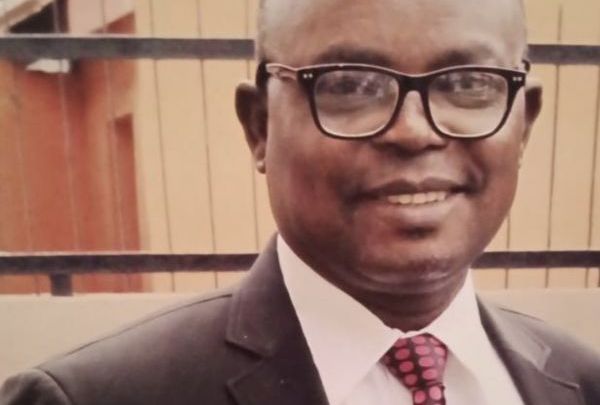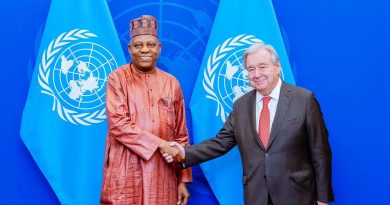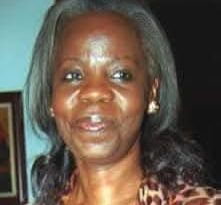Requiem For A Friend And Brother…By Bola BOLAWOLE
turnpot@gmail.com 0807 552 5533, 0803 251 0193
Our crossing of paths left an indelible mark when Banji Adekunle and his bosom friend, Taiye Oladapo, were both undergraduates at the University of Ibadan (U. I.) and I was serving my one-year mandatory NYSC national service at the same university after graduating from the University of Ife (now Obafemi Awolowo University), Ile-Ife. I remember that Banji and Taiye took me to Professor Moses Ayodele Olade (an Owo son), the then Head of the Department of Geology in the same university, who facilitated my admission into the university’s Department of Political Science to study for my Master’s degree.
Banji, myself and 23 others, including Taiye Oladapo, were pioneer members of our social club, The Krown Klub, Owo. While Banji was the Director of Finance and Taiye the Scribe or General Secretary, I was the Director of Public Relations. Ganiyu Banji ADEKUNLE was Number One on the club’s nominal roll, which was set out in alphabetical order.
In 1985 or thereabouts, Banji and I collaborated on a trading venture – A & B Trading Concern – at his instigation, in line with his professional calling as an economist/banker. We started out using his father’s cocoa house building along Ogbon-Omo Street, Owo under the tutelage of Uncle Mike. May Uncle Mike’s soul continue to rest in peace! Both Uncle Mike and Banji shared many things in common: They were humble, courteous, humane and sympathetic to the plight of others.
Banji read Economics and later went on to work at Afribank, Ilesha branch and afterwards at the Kwara state-owned Trade Bank in Lagos, facilitated, I believe, by Alhaji Jamiu Ekungba, who was Trade Bank’s Chief Inspector at some point. Taiye Oladapo also worked at Trade Bank. On his relocation to Lagos, Banji lived with me (and Tola) at our 85, Kujore Street, Ojota residence; he came along with a friend of his, Odunayo, who is also gutted by Banji’s transition.
For reasons which I need not recount here, my interest in our joint business concern waned; especially with my professional calling as a journalist taking me in a different direction from Banji’s keen interest in the business side of life. Banji made an exponential success of his business undertakings, such that if, today, he is reckoned with among the business moguls of Nigeria, it would have been well deserved. But the environment of business is unpredictable; it is one in which all things are not ceteris paribus, as the economists would say. Errors of omission and commission, factors beyond anyone’s control, and, above all, policy somersaults and regime change (the coming into power of Gen. Sani Abacha) adversely affected Banji’s business fortunes, confining him abroad for a lengthy period of time against his personal wishes and desires.
That enforced exile of many years adversely affected not just his business but also his family life, with his young family – Ladun and two-year-old Samuel, bearing the brunt. What Banji passed through during this period is better imagined than experienced; but in this daunting adversity, his never-say-die spirit was not broken. Importantly, his faith in God grew over leaps and bounds – and that was what sustained him.
It was while in exile in the United Kingdom that he had his most profound and memorable experience with God. It was here that he got linked up with the giants of God like Dr. Morris Cerullo, a well noted American Pentecostal evangelist. It was also here that he wrote his impactful book titled “No Bankrupt in Zion.” He sent the manuscripts from London via courier service to me in Lagos to edit; after which I sent the edited work back to him. You need to read the book to benefit from the nuggets encapsulated therein.
It was in this book that I learnt about his novel way of communing with God. Alone and lonely in foreign land where he had no family, no friend, and no adviser, he would arrange four seats and invite God the Father, the Son, and the Holy Spirit to take their seat. He would then sit on the fourth seat and begin to audibly present his petitions to the triune God as if he was seeing them! Believe you me, Banji said it worked!
It was also in Banji’s “No Bankrupt in Zion” that I first came across Alexis de Tocqueville, a brilliant French judge’s often-contested quotation in his book, “Democracy in America”, written in 1840, about the source of America’s power: “I sought for the greatness and genius of America in her commodious harbours and her ample rivers – and it was not there…In her fertile fields and boundless forests – and it was not there…In her rich mines and her vast world commerce – and it was not there…In her democratic Congress and her matchless Constitution – and it was not there. Not until I went into the churches of America and heard her pulpits aflame with righteousness did I understand the secret of her genius and power. America is great because she is good, and if America ever ceases to be good, she will cease to be great.”
In our prevailing circumstances in Nigeria, does that ring a bell? Little wonder, then, that the official motto of the United States of America is, “In God we trust”, which the US adopted in 1956, after it was signed into law by its 34th president, Dwight David Eisenhower. And it has since appeared on all U.S. currency. Before then, “E pluribus unum”, a Latin phrase which means “Out of many, one” was the de facto motto of the U. S., appearing on the Great Seal of the United States. Although it has been replaced by “In God we trust”, it still remains a prominent symbol of national unity.
A country’s motto – same thing as its national anthem – when carefully and thoughtfully chosen, and when it reflects its history, vision, and mission, is not treated with disdain or handled with levity and cannot be easily jettisoned. “E Pluribus unum” remains relevant to the U. S. which has forged one country or nation out of many diverse nationalities, and which continues to remind itself of the vision and mission of its fore-fathers and founders, the labours of its heroes past that must not be allowed to go down the drains or be taken in vain; and the duty that succeeding generations of leaders owe past, present, and future generations to keep that dream alive, despite the fact that, now and again, the faultlines of ethnic discrimination and, to a lesser extent, religious divide and economic inequalities, rear their ugly heads.
“In God we trust” reminds everyone that the US is not the touted “policeman of the world” just for the purpose of imposing and preserving “Pax Americana” for political, economic and military reasons, but it is also a nation of God with a mandate to defend God’s children wherever adversity may rise against them. President Donald Trump’s designation of Nigeria as a “Country of Particular Concern” in respect of alleged genocide against Christians by Islamic fundamentalists bears relevance here.
No Bankrupt in Zion’s Back of the Book summarised what Banji went through in exile: “Surely things could not get any worse! In debt, stranded in London without a work permit, forced to use a false name to obtain the most menial of work and separated from his family and friends, many of whom were detained without trial in Nigeria, was suicide the only answer? In desperation, and down to his last five pence, this one-time successful businessman turned to prayer. Would his prayer be answered and, if so, would the answer be the one he wanted? Only time will tell, but time does not appear to be on his side…”
It will not be out of place to expect someone who passed through what Banji experienced to be bitter and to apportion blame – but not Banji. Conversely, he was the one that was maligned by many! In the “Acknowledgements” to his book, Banji said he would, “against all expectations…sincerely give special thanks to those who consciously and unconsciously put pebbles, stones and hurdles on my path through life.” Why? Because “without their knowing, they have made my life very exciting. I would possibly not have had problems big enough to cause me to release my affairs to the living God without this group of people”.
Nice talk! But tried as he did, Banji that came back from exile was not the same that went. Can we blame him? A man is the sum total of his experiences. Until he breathed his last, Banji was, however, a minister of God and a dedicated family man. His book, “No Bankrupt in Zion”, speaks eloquently to these facts. He dedicated the book to “Ladun, my beloved wife, and Samuel, my son, who had just marked his second birthday when I set out on a supposed two-week journey that turned out to be a five-year absence from a loving family that I was expected to lead on the way of the Lord.” Five years when he wrote the book; five or so more years thereafter!
This much I know: Whatever anyone may say, Banji had a good heart. And I should know because we shared the same roof, like Bob Marley crooned. We slept on the same bed! We shared life-impacting moments! We dined and wined together, dipping our hands in the same pot! We carried the same ideas in our heart and the same ideals in our head. We walked naked before each other – and we were not ashamed!
Gani, go in peace! Sleep well, Banji! Enjoy the rest of your Lord and Saviour, Jesus Christ! We shall meet again! Then, and only then, will you flash your inimitable smile again!
LAST WORD: Exactly 19 years ago this day 26th November, 2006 my mother changed mortality for immortality. Every thought of her passing opens wounds and brings back pains – what should have been and what were not! Why’s and How’s! But fond memories of a life sacrificially lived and an immeasurable love bestowed on all that crossed her path soothe the pains. I guess that is what it will always be. One day I hope to pull myself together to say a few words about my mother, FLORENCE OLUWAGBEMIGUN. Maybe this time next year, God willing! Till then, Iyemi le o!
Former editor of PUNCH newspapers, Chairman of its Editorial Board and Deputy Editor-in-chief, BOLAWOLE was also the Managing Director/Editor-in-chief of The Westerner news magazine. He writes the ON THE LORD’S DAY column in the Sunday Tribune and TREASURES column in New Telegraph newspaper on Wednesdays. He is also a public affairs analyst on radio and television.




